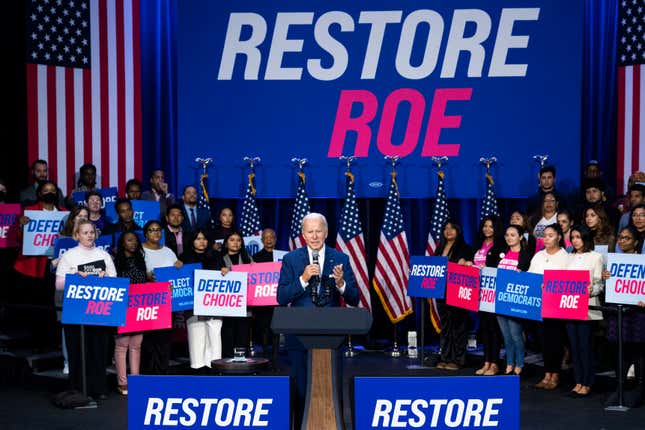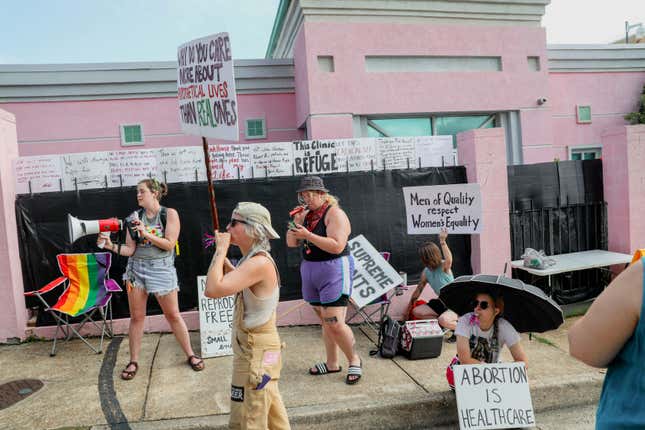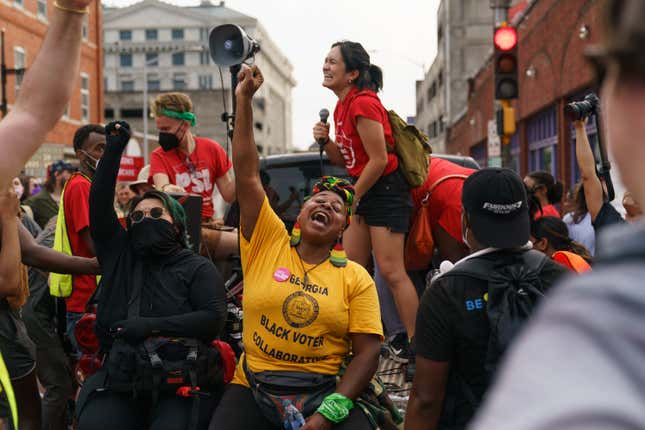We Deserve So Much Better Than ‘Restore Roe’
Enough with the compromises. It's time to embrace an abortion philosophy that won't leave anyone behind.
In DepthIn Depth
Illustration: Vicky Leta
Roe v. Wade meant the world to a lot of people. It meant the ability to finish school, leave an abusive relationship, care for the children they already had—it became a sort of shorthand for women’s equality in the U.S. People are understandably heartbroken that it’s gone and states are now allowed to force people to give birth. But the hard truth is that Roe was never as good as some thought it was. The 1973 ruling left a lot of people behind.
Under Roe, bans on insurance coverage and telemedicine flourished. States gleefully put patients through multi-day waiting periods, misleading counseling, and invasive ultrasounds before their appointments. Clinics closed their doors. Abortion was rendered a right in name only. Yet, there’s been a lot of talk about codifying Roe. President Joe Biden even stood in front of “Restore Roe” signs last October and pledged to sign a bill enshrining Roe’s protections into federal law if Democrats kept the House and Senate in the midterms. We all know how that went. Now, we’re left with a carrot dangled for the 2024 election, like so many elections before it. And what a limp, shriveled carrot it is.
“Having a federal protection for abortion in this country was absolutely important for our communities,” Monica Raye Simpson, executive director of Atlanta-based reproductive justice organization SisterSong, told Jezebel. But, “We have to think bigger—we have to. Lives are at stake, so we have to think bigger than what never held us all.”
It’s time to ask ourselves: Why would we fight to restore something that didn’t guarantee true reproductive freedom for everyone? We can do better, and it starts by realizing that we can demand better. We should be treating abortion not as some kind of a political football, but as a fundamental human right.
How
In 1973, we got what the court wrote, not the legislation activists wanted. And while Roe guaranteed the right for doctors to provide abortions up to a certain point in pregnancy—a later decision put that limit at when a fetus becomes “viable” outside the uterus, around 24 weeks—it did not guarantee the right for abortion seekers to access the procedure. Three years later, it got its first gutting when Congress passed the Hyde Amendment, which banned federal funding for abortions, effectively blocking access for low-income people with Medicaid insurance. Still, the Democratic party supported the Hyde Amendment in its presidential platform all the way until 2016, and Biden had to be dragged kicking and screaming to say he opposed it ahead of his 2020 nomination.

Roe’s weaknesses were obvious long before 2016. This is underscored by the mere fact that abortion funds exist. Laurie Bertram Roberts, executive director of the Mississippi Reproductive Freedom Fund, has been helping people pay for their abortions and any travel they might need to get them for almost 10 years. Roe never meant much to people in places like Mississippi, a state that had just one abortion clinic since 2004—almost 20 years before Roe fell—and only offered abortions through 16 weeks of pregnancy. “There’s so much other work I would love to be doing rather than providing diapers to people and funding for abortion,” Bertram Roberts told Jezebel. “We could be doing other things as a whole, as a community, than scrounging up vital resources for people, which should not be our job. Basic needs for people should be provided by our government.”
With patients across the country scrambling to afford care, many clinics tried to keep prices low, forcing them to run on tight budgets and underpay their staff. When insurance doesn’t cover abortion, “all of that trickles down,” said Ghazaleh Moayedi, an OB/GYN who used to provide abortions in Texas and Oklahoma, two states that banned nearly all abortion while Roe was still on the books. She is also the founder of Pegasus Health Justice Center and on the board of directors with Physicians for Reproductive Health and Texas Equal Access Fund. “People need to be able to freely access health care and health care providers from all levels—physicians but also the clinic staff, people answering the phones, people cleaning the clinic. Everyone deserves to be compensated fairly, too,” she told Jezebel.
While abortion funds and clinics were sandbagging the holes in Roe, states took sledgehammers to the dam.
-

-

-

-

-

-

-

-

-

-

-

-

-

-

-

-

-

-

-

-

-

-

-

-

-

-

-

-

-

-

-

-

-

-

-

-

-

-

-

-










































